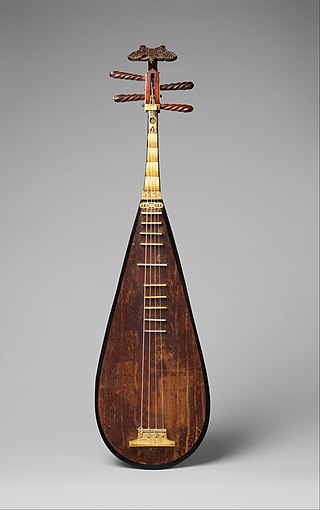
The pipa, pípá, or p'i-p'a is a traditional Chinese musical instrument belonging to the plucked category of instruments. Sometimes called the "Chinese lute", the instrument has a pear-shaped wooden body with a varying number of frets ranging from 12 to 31. Another Chinese four-string plucked lute is the liuqin, which looks like a smaller version of the pipa. The pear-shaped instrument may have existed in China as early as the Han dynasty, and although historically the term pipa was once used to refer to a variety of plucked chordophones, its usage since the Song dynasty refers exclusively to the pear-shaped instrument.

Meredith Jane Monk is an American composer, performer, director, vocalist, filmmaker, and choreographer. From the 1960s onwards, Monk has created multi-disciplinary works which combine music, theatre, and dance, recording extensively for ECM Records. In 1991, Monk composed Atlas, an opera, commissioned and produced by the Houston Opera and the American Music Theater Festival. Her music has been used in films by the Coen Brothers and Jean-Luc Godard. Trip hop musician DJ Shadow sampled Monk's "Dolmen Music" on the song "Midnight in a Perfect World". In 2015, she was awarded the National Medal of Arts by Barack Obama.

The erhu is a Chinese two-stringed bowed musical instrument, more specifically a spike fiddle, which may also be called a southern fiddle, and is sometimes known in the Western world as the Chinese violin or a Chinese two-stringed fiddle.

Evan Ziporyn is an American composer of post-minimalist music with a cross-cultural orientation, drawing equally from classical music, avant-garde, various world music traditions, and jazz. Ziporyn has composed for a wide range of ensembles, including symphony orchestras, wind ensembles, many types of chamber groups, and solo works, sometimes involving electronics. Balinese gamelan, for which he has composed numerous works, has compositions. He is known for his solo performances on clarinet and bass clarinet; additionally, Ziporyn plays gender wayang and other Balinese instruments, saxophones, piano & keyboards, EWI, and Shona mbira.
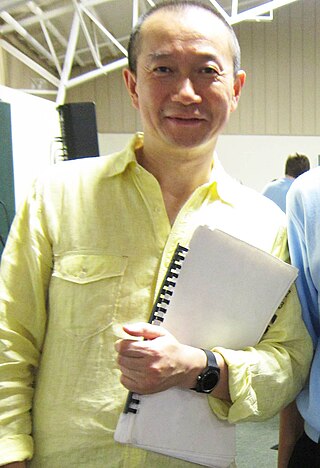
Tan Dun is a Chinese-born American composer and conductor. A leading figure of contemporary classical music, he draws from a variety of Western and Chinese influences, a dichotomy which has shaped much of his life and music. Having collaborated with leading orchestras around the world, Tan is the recipient of numerous awards, including a Grawemeyer Award for his opera Marco Polo (1996) and both an Academy Award and Grammy Award for his film score in Ang Lee's Crouching Tiger, Hidden Dragon (2000). His oeuvre as a whole includes operas, orchestral, vocal, chamber, solo and film scores, as well as genres that Tan terms "organic music" and "music ritual."

The term Chinese orchestra is most commonly used to refer to the modern Chinese orchestra that is found in China and various overseas Chinese communities. This modern Chinese orchestra first developed out of Jiangnan sizhu ensemble in the 1920s into a form that is based on the structure and principles of a Western symphony orchestra but using Chinese instruments. The orchestra is divided into four sections – wind, plucked strings, bowed strings, and percussion, and usually performs modernized traditional music called guoyue. The orchestra may be referred to as Minzu Yuetuan or Minyuetuan in mainland China, Chung Ngok Tuen in Hong Kong, Huayuetuan in Southeast Asia, or Guoyuetuan in Taiwan.

The ruan is a traditional Chinese plucked string instrument. It is a lute with a fretted neck, a circular body, and four strings. Its four strings were formerly made of silk but since the 20th century they have been made of steel. The modern ruan has 24 frets with 12 semitones on each string, which has greatly expanded its range from a previous 13 frets. The frets are commonly made of ivory or in recent times of metal mounted on wood. The metal frets produce a brighter tone as compared to the ivory frets. It is sometimes called ruanqin, particularly in Taiwan.

Aulis Heikki Sallinen is a Finnish contemporary classical music composer. His music has been variously described as "remorselessly harsh", a "beautifully crafted amalgam of several 20th-century styles", and "neo-romantic". Sallinen studied at the Sibelius Academy, where his teachers included Joonas Kokkonen. He has had works commissioned by the Kronos Quartet, and has also written seven operas, eight symphonies, concertos for violin, cello, flute, horn, and English horn, as well as several chamber works. He won the Nordic Council Music Prize in 1978 for his opera Ratsumies.
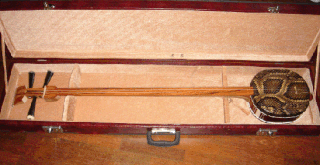
The sanxian is a three-stringed traditional Chinese lute. It has a long fretless fingerboard, and the body is traditionally made from snake skin stretched over a rounded rectangular resonator. It is made in several sizes for different purposes and in the early 20th century a four-stringed version, the jiaxian sanxian (加弦三弦), was developed. The northern sanxian is generally larger, at about 122 cm (48 in) in length, while southern versions of the instrument are usually about 95 cm (37 in) in length.

Wu Man is a Chinese pipa player and composer. Trained in Pudong-style pipa performance at the Central Conservatory of Music in Beijing, she is known for playing in a broad range of musical styles and introducing the pipa and its Chinese heritage into Western genres. She has performed and recorded extensively with Kronos Quartet and Silk Road Ensemble, and has premiered works by Philip Glass, Lou Harrison, Terry Riley, Bright Sheng, Tan Dun, Zhao Jiping, and Zhou Long, among many others. She has recorded and appeared on over 40 albums, five of which have been nominated for Grammy Awards. In 2013, she was named Instrumentalist of the Year by Musical America, becoming the first performer of a non-Western instrument to receive this award. She also received The United States Artists Award in 2008.
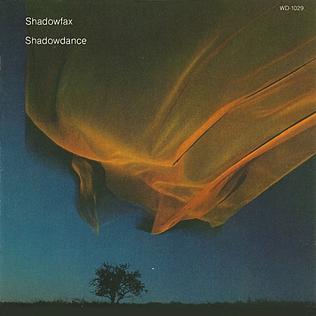
Shadowdance is the third studio album by new-age group Shadowfax, the second for Windham Hill Records.
Black Angels, subtitled "Thirteen Images from the Dark Land", is a work for "electric string quartet" by the American avant-garde composer George Crumb. It was composed over the course of a year and is dated "Friday the Thirteenth, March 1970 " as written on the score. The Latin phrase in tempore belli, in time of war, written into the score by Crumb is a reference to the Vietnam War taking place at the time when Black Angels was composed.
Traditional Vietnamese musical instruments are the musical instruments used in the traditional and classical musics of Vietnam. They comprise a wide range of string, wind, and percussion instruments, used by both the Viet majority as well as the nation's ethnic minorities.
Jiangnan sizhu is a style of traditional Chinese instrumental music from the Jiangnan region of China.

Zhou Yi is a Chinese pipa player.
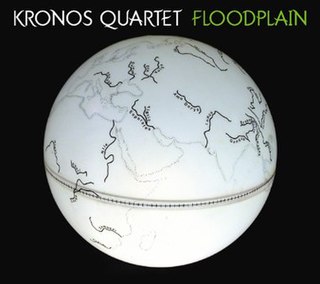
Floodplain is a studio album by the Kronos Quartet released in 2009. All twelve compositions were written or arranged for the quartet.

Early Music is a studio album by the Kronos Quartet, containing 21 compositions, many of which were written, arranged, or transcribed for the quartet. The subtitle is from Dowland's Lachrimae, or Seaven Teares of 1604.
Xu Yi is a Chinese-born French composer and music educator in France.

You've Stolen My Heart is a 2005 studio album from the Kronos Quartet, featuring arrangements of the music of Indian composer Rahul Dev Burman, with vocals by Asha Bhosle, she sang the original versions of the album's songs and was married to Burman until his death in 1994. The album features keyboards, autoharp, and various percussion instruments in addition to the Kronos Quartet's core string quartet instruments. The recordings also feature Indian percussionist Zakir Hussain and Chinese pipa virtuoso Wu Man.

Yang Jing is a Chinese born, Swiss composer and world-famous concert pipa soloist.
















